Purpose of Education: Now and Future
VerifiedAdded on 2019/09/16
|24
|5930
|398
Essay
AI Summary
This essay delves into the fundamental question of education's purpose, both in the present and future contexts. It explores the aims of education, its relationship with society, and the transformative role of educational technology. The essay discusses how education contributes to individual and social development, and how technology is reshaping the learning environment. It also addresses the importance of integrating technology into education to prepare students for the future, emphasizing the need for teachers to adapt to these changes. The essay concludes by highlighting the potential of educational technology to enhance learning and improve the quality of education.

What is education for, what is its purpose, both here and now and
looking to the future?
Name
Submitted to
Date
looking to the future?
Name
Submitted to
Date
Paraphrase This Document
Need a fresh take? Get an instant paraphrase of this document with our AI Paraphraser

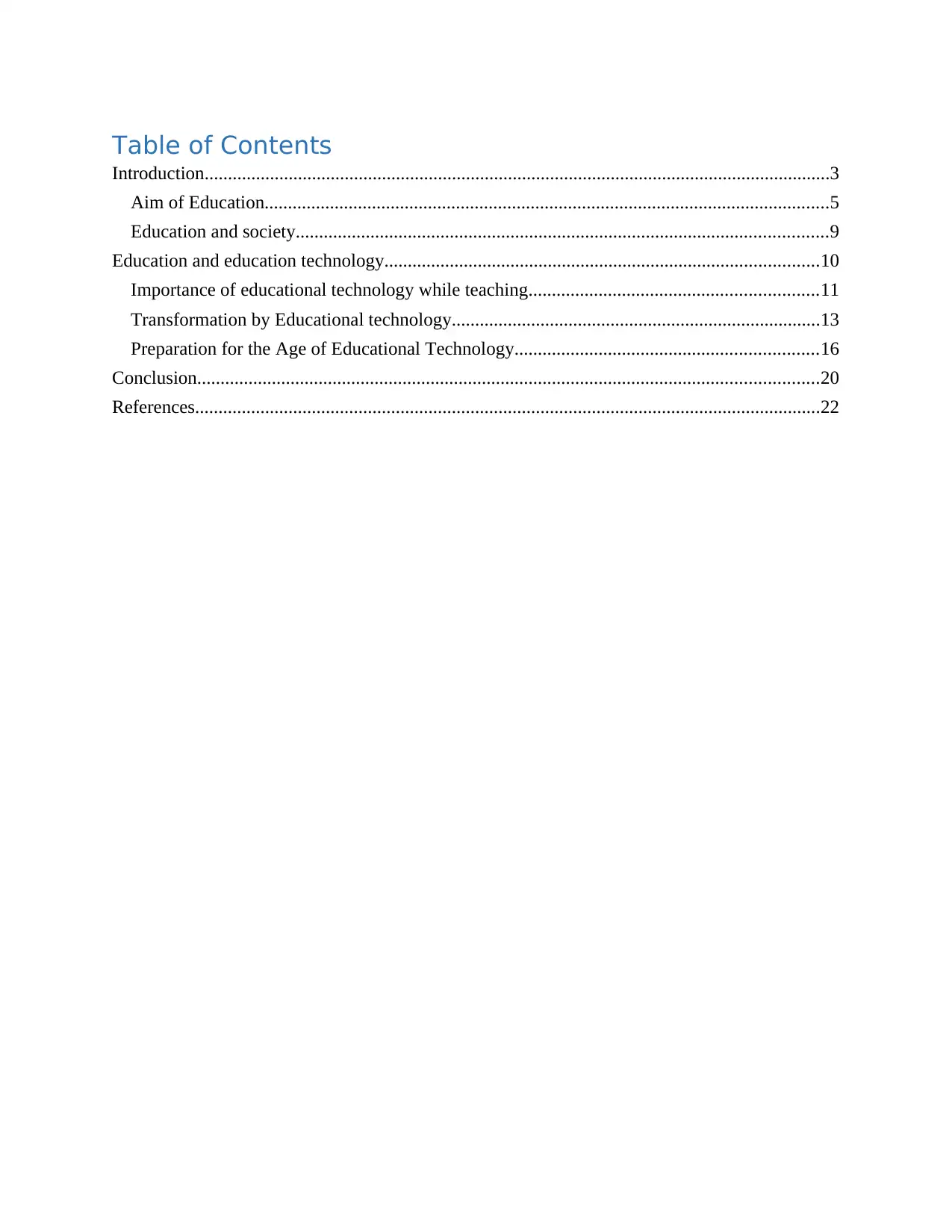
Table of Contents
Introduction......................................................................................................................................3
Aim of Education.........................................................................................................................5
Education and society..................................................................................................................9
Education and education technology.............................................................................................10
Importance of educational technology while teaching..............................................................11
Transformation by Educational technology...............................................................................13
Preparation for the Age of Educational Technology.................................................................16
Conclusion.....................................................................................................................................20
References......................................................................................................................................22
Introduction......................................................................................................................................3
Aim of Education.........................................................................................................................5
Education and society..................................................................................................................9
Education and education technology.............................................................................................10
Importance of educational technology while teaching..............................................................11
Transformation by Educational technology...............................................................................13
Preparation for the Age of Educational Technology.................................................................16
Conclusion.....................................................................................................................................20
References......................................................................................................................................22
⊘ This is a preview!⊘
Do you want full access?
Subscribe today to unlock all pages.

Trusted by 1+ million students worldwide
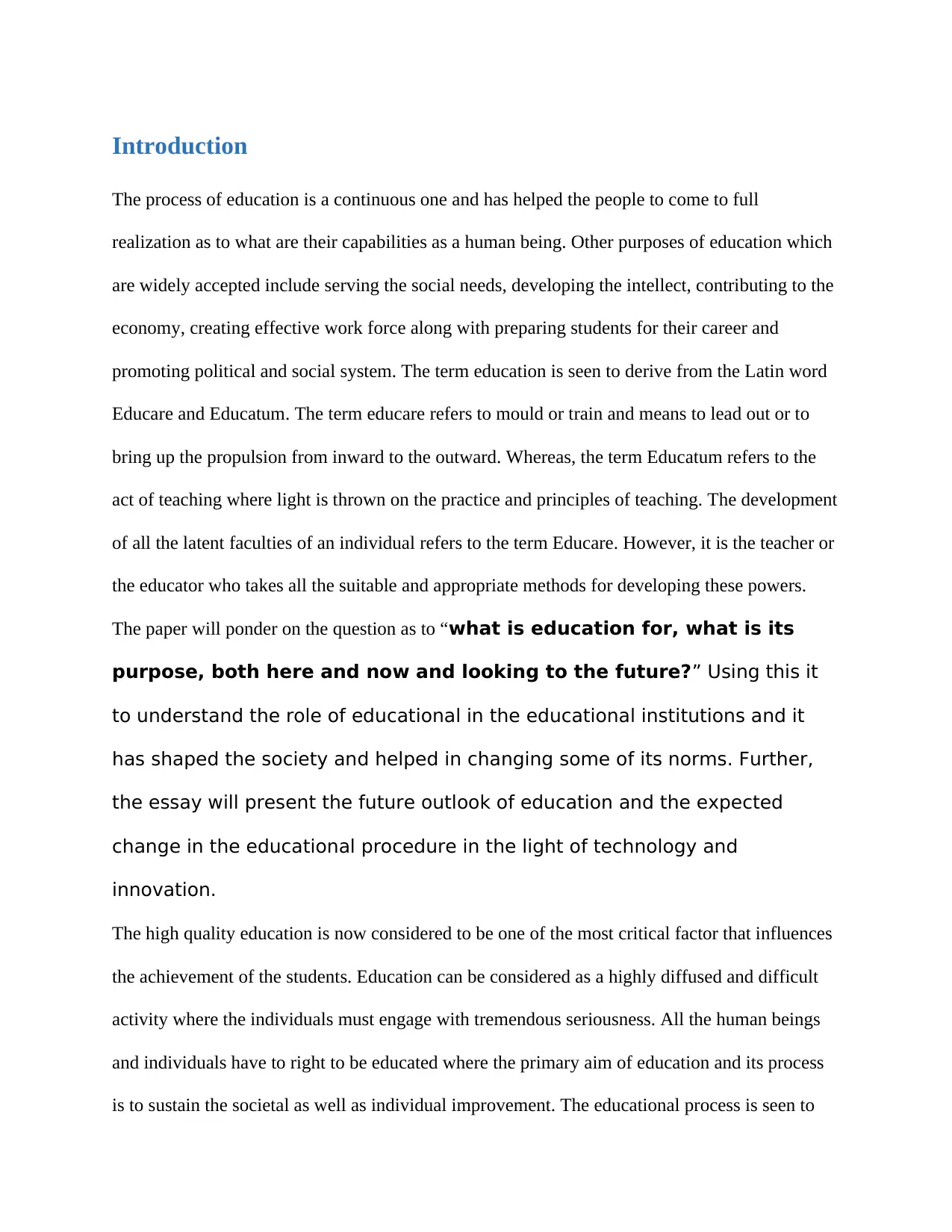
Introduction
The process of education is a continuous one and has helped the people to come to full
realization as to what are their capabilities as a human being. Other purposes of education which
are widely accepted include serving the social needs, developing the intellect, contributing to the
economy, creating effective work force along with preparing students for their career and
promoting political and social system. The term education is seen to derive from the Latin word
Educare and Educatum. The term educare refers to mould or train and means to lead out or to
bring up the propulsion from inward to the outward. Whereas, the term Educatum refers to the
act of teaching where light is thrown on the practice and principles of teaching. The development
of all the latent faculties of an individual refers to the term Educare. However, it is the teacher or
the educator who takes all the suitable and appropriate methods for developing these powers.
The paper will ponder on the question as to “what is education for, what is its
purpose, both here and now and looking to the future?” Using this it
to understand the role of educational in the educational institutions and it
has shaped the society and helped in changing some of its norms. Further,
the essay will present the future outlook of education and the expected
change in the educational procedure in the light of technology and
innovation.
The high quality education is now considered to be one of the most critical factor that influences
the achievement of the students. Education can be considered as a highly diffused and difficult
activity where the individuals must engage with tremendous seriousness. All the human beings
and individuals have to right to be educated where the primary aim of education and its process
is to sustain the societal as well as individual improvement. The educational process is seen to
The process of education is a continuous one and has helped the people to come to full
realization as to what are their capabilities as a human being. Other purposes of education which
are widely accepted include serving the social needs, developing the intellect, contributing to the
economy, creating effective work force along with preparing students for their career and
promoting political and social system. The term education is seen to derive from the Latin word
Educare and Educatum. The term educare refers to mould or train and means to lead out or to
bring up the propulsion from inward to the outward. Whereas, the term Educatum refers to the
act of teaching where light is thrown on the practice and principles of teaching. The development
of all the latent faculties of an individual refers to the term Educare. However, it is the teacher or
the educator who takes all the suitable and appropriate methods for developing these powers.
The paper will ponder on the question as to “what is education for, what is its
purpose, both here and now and looking to the future?” Using this it
to understand the role of educational in the educational institutions and it
has shaped the society and helped in changing some of its norms. Further,
the essay will present the future outlook of education and the expected
change in the educational procedure in the light of technology and
innovation.
The high quality education is now considered to be one of the most critical factor that influences
the achievement of the students. Education can be considered as a highly diffused and difficult
activity where the individuals must engage with tremendous seriousness. All the human beings
and individuals have to right to be educated where the primary aim of education and its process
is to sustain the societal as well as individual improvement. The educational process is seen to
Paraphrase This Document
Need a fresh take? Get an instant paraphrase of this document with our AI Paraphraser
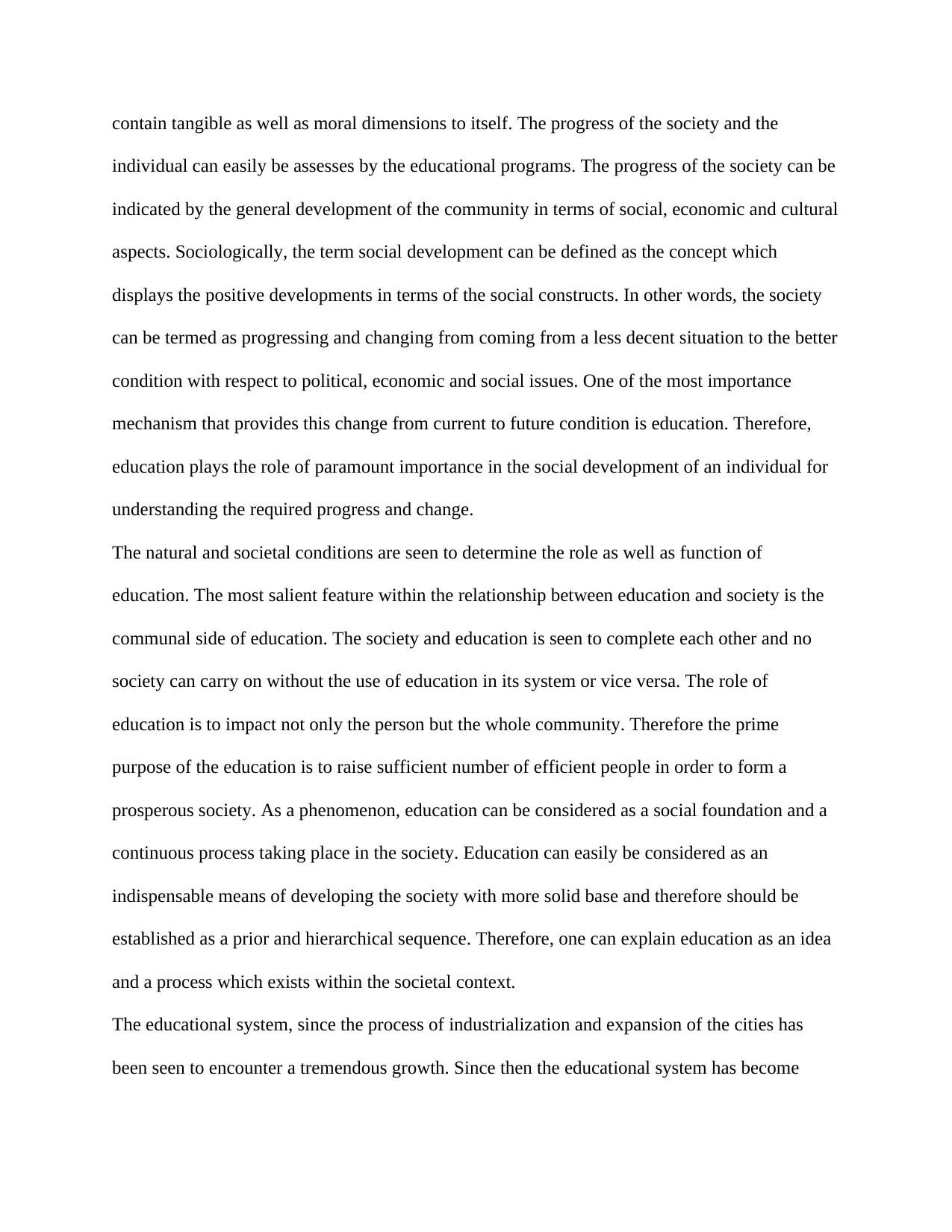
contain tangible as well as moral dimensions to itself. The progress of the society and the
individual can easily be assesses by the educational programs. The progress of the society can be
indicated by the general development of the community in terms of social, economic and cultural
aspects. Sociologically, the term social development can be defined as the concept which
displays the positive developments in terms of the social constructs. In other words, the society
can be termed as progressing and changing from coming from a less decent situation to the better
condition with respect to political, economic and social issues. One of the most importance
mechanism that provides this change from current to future condition is education. Therefore,
education plays the role of paramount importance in the social development of an individual for
understanding the required progress and change.
The natural and societal conditions are seen to determine the role as well as function of
education. The most salient feature within the relationship between education and society is the
communal side of education. The society and education is seen to complete each other and no
society can carry on without the use of education in its system or vice versa. The role of
education is to impact not only the person but the whole community. Therefore the prime
purpose of the education is to raise sufficient number of efficient people in order to form a
prosperous society. As a phenomenon, education can be considered as a social foundation and a
continuous process taking place in the society. Education can easily be considered as an
indispensable means of developing the society with more solid base and therefore should be
established as a prior and hierarchical sequence. Therefore, one can explain education as an idea
and a process which exists within the societal context.
The educational system, since the process of industrialization and expansion of the cities has
been seen to encounter a tremendous growth. Since then the educational system has become
individual can easily be assesses by the educational programs. The progress of the society can be
indicated by the general development of the community in terms of social, economic and cultural
aspects. Sociologically, the term social development can be defined as the concept which
displays the positive developments in terms of the social constructs. In other words, the society
can be termed as progressing and changing from coming from a less decent situation to the better
condition with respect to political, economic and social issues. One of the most importance
mechanism that provides this change from current to future condition is education. Therefore,
education plays the role of paramount importance in the social development of an individual for
understanding the required progress and change.
The natural and societal conditions are seen to determine the role as well as function of
education. The most salient feature within the relationship between education and society is the
communal side of education. The society and education is seen to complete each other and no
society can carry on without the use of education in its system or vice versa. The role of
education is to impact not only the person but the whole community. Therefore the prime
purpose of the education is to raise sufficient number of efficient people in order to form a
prosperous society. As a phenomenon, education can be considered as a social foundation and a
continuous process taking place in the society. Education can easily be considered as an
indispensable means of developing the society with more solid base and therefore should be
established as a prior and hierarchical sequence. Therefore, one can explain education as an idea
and a process which exists within the societal context.
The educational system, since the process of industrialization and expansion of the cities has
been seen to encounter a tremendous growth. Since then the educational system has become
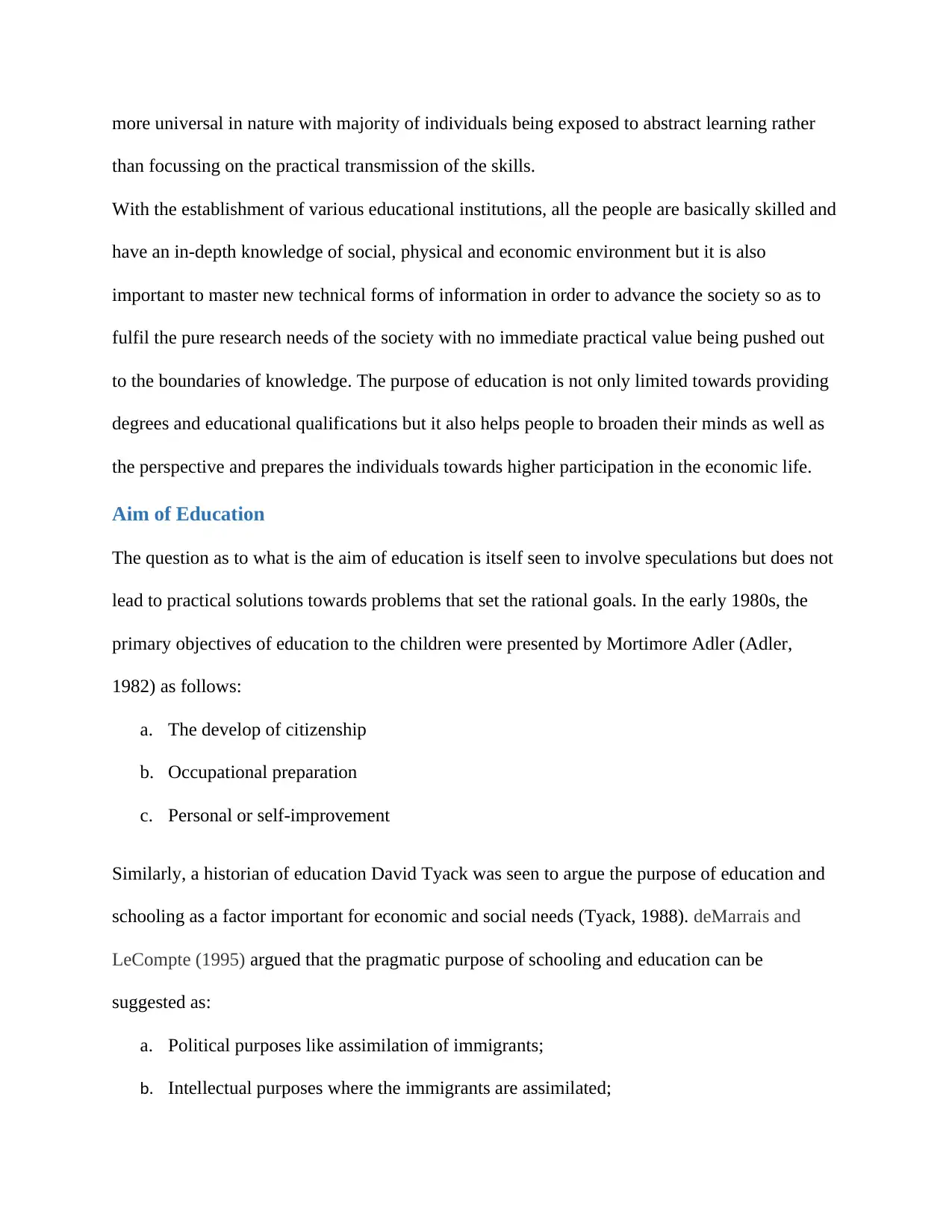
more universal in nature with majority of individuals being exposed to abstract learning rather
than focussing on the practical transmission of the skills.
With the establishment of various educational institutions, all the people are basically skilled and
have an in-depth knowledge of social, physical and economic environment but it is also
important to master new technical forms of information in order to advance the society so as to
fulfil the pure research needs of the society with no immediate practical value being pushed out
to the boundaries of knowledge. The purpose of education is not only limited towards providing
degrees and educational qualifications but it also helps people to broaden their minds as well as
the perspective and prepares the individuals towards higher participation in the economic life.
Aim of Education
The question as to what is the aim of education is itself seen to involve speculations but does not
lead to practical solutions towards problems that set the rational goals. In the early 1980s, the
primary objectives of education to the children were presented by Mortimore Adler (Adler,
1982) as follows:
a. The develop of citizenship
b. Occupational preparation
c. Personal or self-improvement
Similarly, a historian of education David Tyack was seen to argue the purpose of education and
schooling as a factor important for economic and social needs (Tyack, 1988). deMarrais and
LeCompte (1995) argued that the pragmatic purpose of schooling and education can be
suggested as:
a. Political purposes like assimilation of immigrants;
b. Intellectual purposes where the immigrants are assimilated;
than focussing on the practical transmission of the skills.
With the establishment of various educational institutions, all the people are basically skilled and
have an in-depth knowledge of social, physical and economic environment but it is also
important to master new technical forms of information in order to advance the society so as to
fulfil the pure research needs of the society with no immediate practical value being pushed out
to the boundaries of knowledge. The purpose of education is not only limited towards providing
degrees and educational qualifications but it also helps people to broaden their minds as well as
the perspective and prepares the individuals towards higher participation in the economic life.
Aim of Education
The question as to what is the aim of education is itself seen to involve speculations but does not
lead to practical solutions towards problems that set the rational goals. In the early 1980s, the
primary objectives of education to the children were presented by Mortimore Adler (Adler,
1982) as follows:
a. The develop of citizenship
b. Occupational preparation
c. Personal or self-improvement
Similarly, a historian of education David Tyack was seen to argue the purpose of education and
schooling as a factor important for economic and social needs (Tyack, 1988). deMarrais and
LeCompte (1995) argued that the pragmatic purpose of schooling and education can be
suggested as:
a. Political purposes like assimilation of immigrants;
b. Intellectual purposes where the immigrants are assimilated;
⊘ This is a preview!⊘
Do you want full access?
Subscribe today to unlock all pages.

Trusted by 1+ million students worldwide
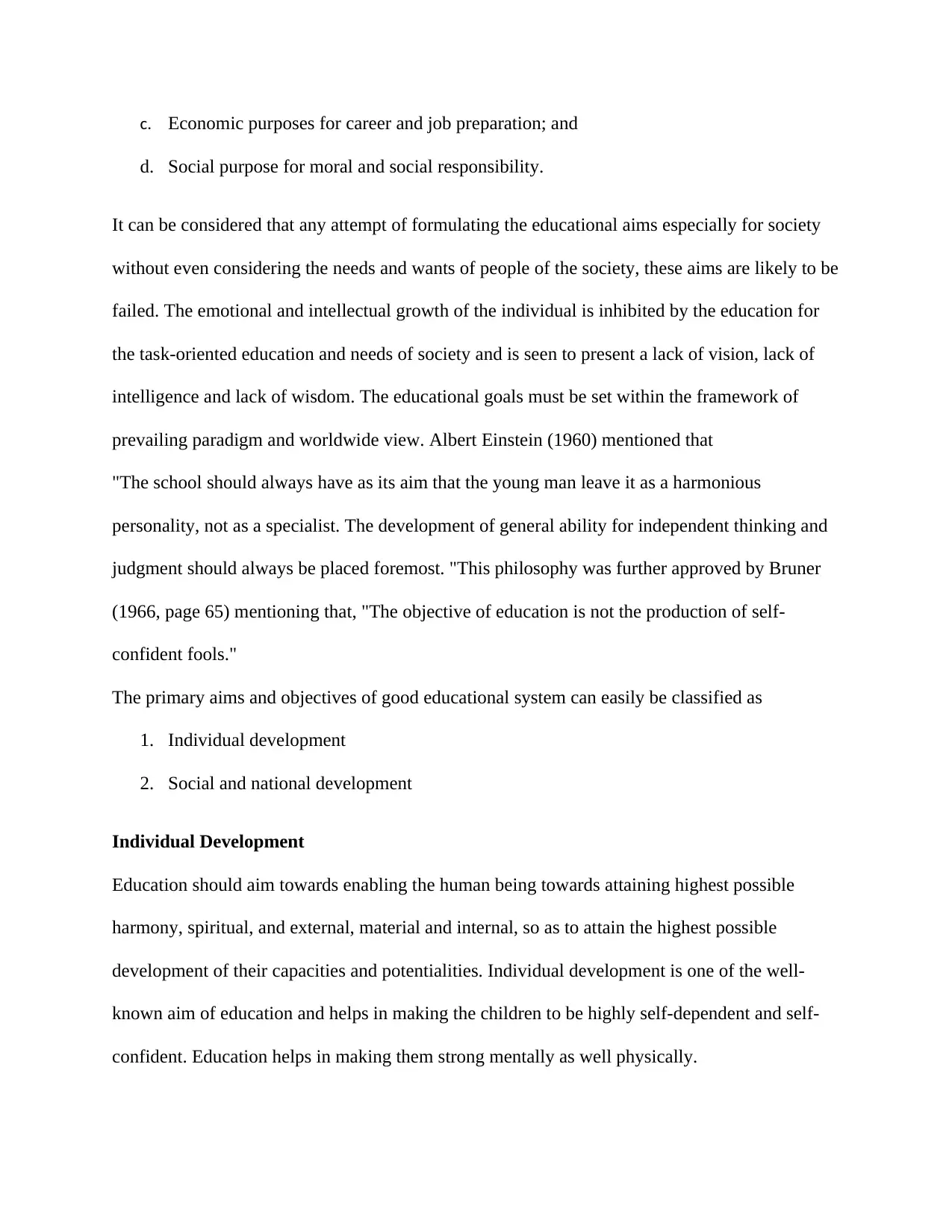
c. Economic purposes for career and job preparation; and
d. Social purpose for moral and social responsibility.
It can be considered that any attempt of formulating the educational aims especially for society
without even considering the needs and wants of people of the society, these aims are likely to be
failed. The emotional and intellectual growth of the individual is inhibited by the education for
the task-oriented education and needs of society and is seen to present a lack of vision, lack of
intelligence and lack of wisdom. The educational goals must be set within the framework of
prevailing paradigm and worldwide view. Albert Einstein (1960) mentioned that
"The school should always have as its aim that the young man leave it as a harmonious
personality, not as a specialist. The development of general ability for independent thinking and
judgment should always be placed foremost. "This philosophy was further approved by Bruner
(1966, page 65) mentioning that, "The objective of education is not the production of self-
confident fools."
The primary aims and objectives of good educational system can easily be classified as
1. Individual development
2. Social and national development
Individual Development
Education should aim towards enabling the human being towards attaining highest possible
harmony, spiritual, and external, material and internal, so as to attain the highest possible
development of their capacities and potentialities. Individual development is one of the well-
known aim of education and helps in making the children to be highly self-dependent and self-
confident. Education helps in making them strong mentally as well physically.
d. Social purpose for moral and social responsibility.
It can be considered that any attempt of formulating the educational aims especially for society
without even considering the needs and wants of people of the society, these aims are likely to be
failed. The emotional and intellectual growth of the individual is inhibited by the education for
the task-oriented education and needs of society and is seen to present a lack of vision, lack of
intelligence and lack of wisdom. The educational goals must be set within the framework of
prevailing paradigm and worldwide view. Albert Einstein (1960) mentioned that
"The school should always have as its aim that the young man leave it as a harmonious
personality, not as a specialist. The development of general ability for independent thinking and
judgment should always be placed foremost. "This philosophy was further approved by Bruner
(1966, page 65) mentioning that, "The objective of education is not the production of self-
confident fools."
The primary aims and objectives of good educational system can easily be classified as
1. Individual development
2. Social and national development
Individual Development
Education should aim towards enabling the human being towards attaining highest possible
harmony, spiritual, and external, material and internal, so as to attain the highest possible
development of their capacities and potentialities. Individual development is one of the well-
known aim of education and helps in making the children to be highly self-dependent and self-
confident. Education helps in making them strong mentally as well physically.
Paraphrase This Document
Need a fresh take? Get an instant paraphrase of this document with our AI Paraphraser
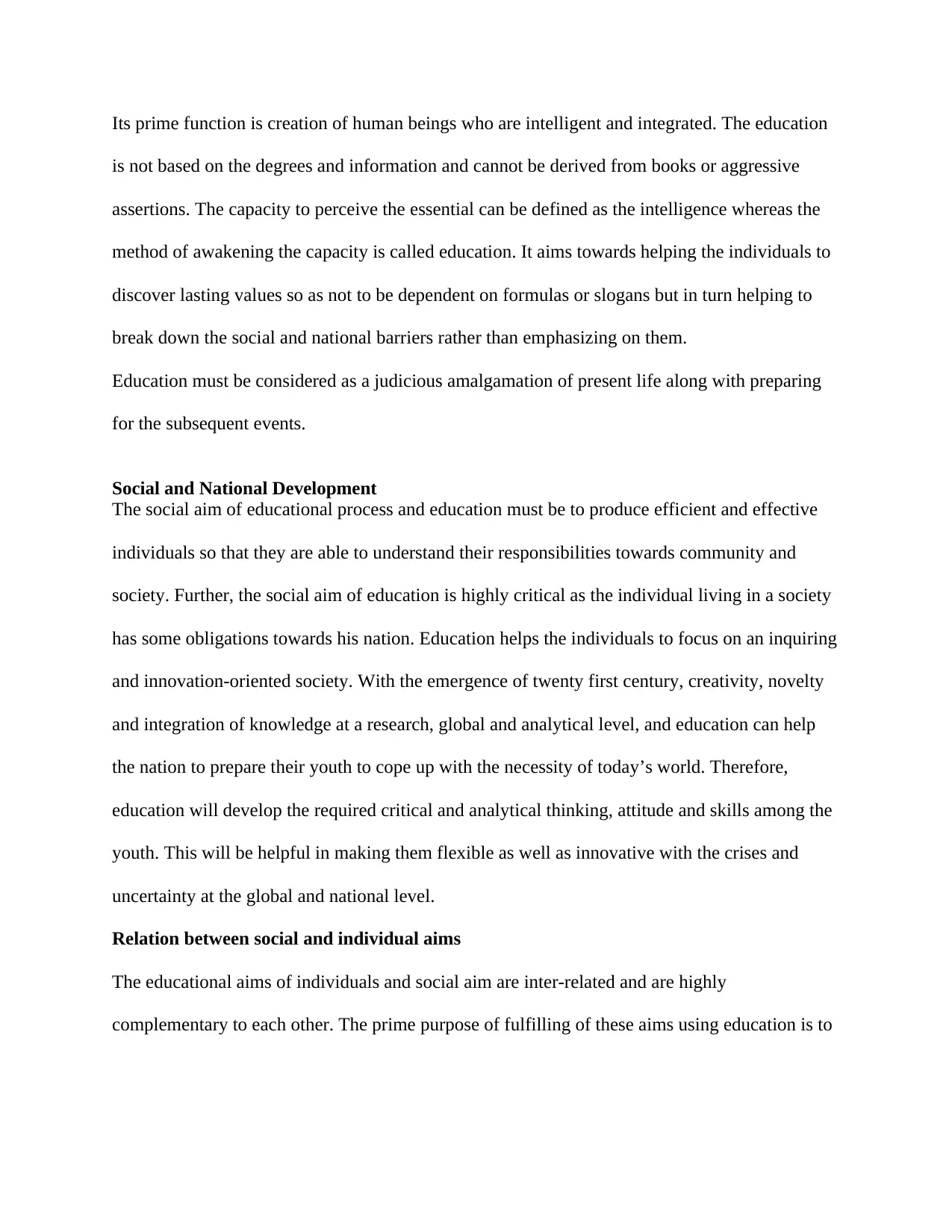
Its prime function is creation of human beings who are intelligent and integrated. The education
is not based on the degrees and information and cannot be derived from books or aggressive
assertions. The capacity to perceive the essential can be defined as the intelligence whereas the
method of awakening the capacity is called education. It aims towards helping the individuals to
discover lasting values so as not to be dependent on formulas or slogans but in turn helping to
break down the social and national barriers rather than emphasizing on them.
Education must be considered as a judicious amalgamation of present life along with preparing
for the subsequent events.
Social and National Development
The social aim of educational process and education must be to produce efficient and effective
individuals so that they are able to understand their responsibilities towards community and
society. Further, the social aim of education is highly critical as the individual living in a society
has some obligations towards his nation. Education helps the individuals to focus on an inquiring
and innovation-oriented society. With the emergence of twenty first century, creativity, novelty
and integration of knowledge at a research, global and analytical level, and education can help
the nation to prepare their youth to cope up with the necessity of today’s world. Therefore,
education will develop the required critical and analytical thinking, attitude and skills among the
youth. This will be helpful in making them flexible as well as innovative with the crises and
uncertainty at the global and national level.
Relation between social and individual aims
The educational aims of individuals and social aim are inter-related and are highly
complementary to each other. The prime purpose of fulfilling of these aims using education is to
is not based on the degrees and information and cannot be derived from books or aggressive
assertions. The capacity to perceive the essential can be defined as the intelligence whereas the
method of awakening the capacity is called education. It aims towards helping the individuals to
discover lasting values so as not to be dependent on formulas or slogans but in turn helping to
break down the social and national barriers rather than emphasizing on them.
Education must be considered as a judicious amalgamation of present life along with preparing
for the subsequent events.
Social and National Development
The social aim of educational process and education must be to produce efficient and effective
individuals so that they are able to understand their responsibilities towards community and
society. Further, the social aim of education is highly critical as the individual living in a society
has some obligations towards his nation. Education helps the individuals to focus on an inquiring
and innovation-oriented society. With the emergence of twenty first century, creativity, novelty
and integration of knowledge at a research, global and analytical level, and education can help
the nation to prepare their youth to cope up with the necessity of today’s world. Therefore,
education will develop the required critical and analytical thinking, attitude and skills among the
youth. This will be helpful in making them flexible as well as innovative with the crises and
uncertainty at the global and national level.
Relation between social and individual aims
The educational aims of individuals and social aim are inter-related and are highly
complementary to each other. The prime purpose of fulfilling of these aims using education is to
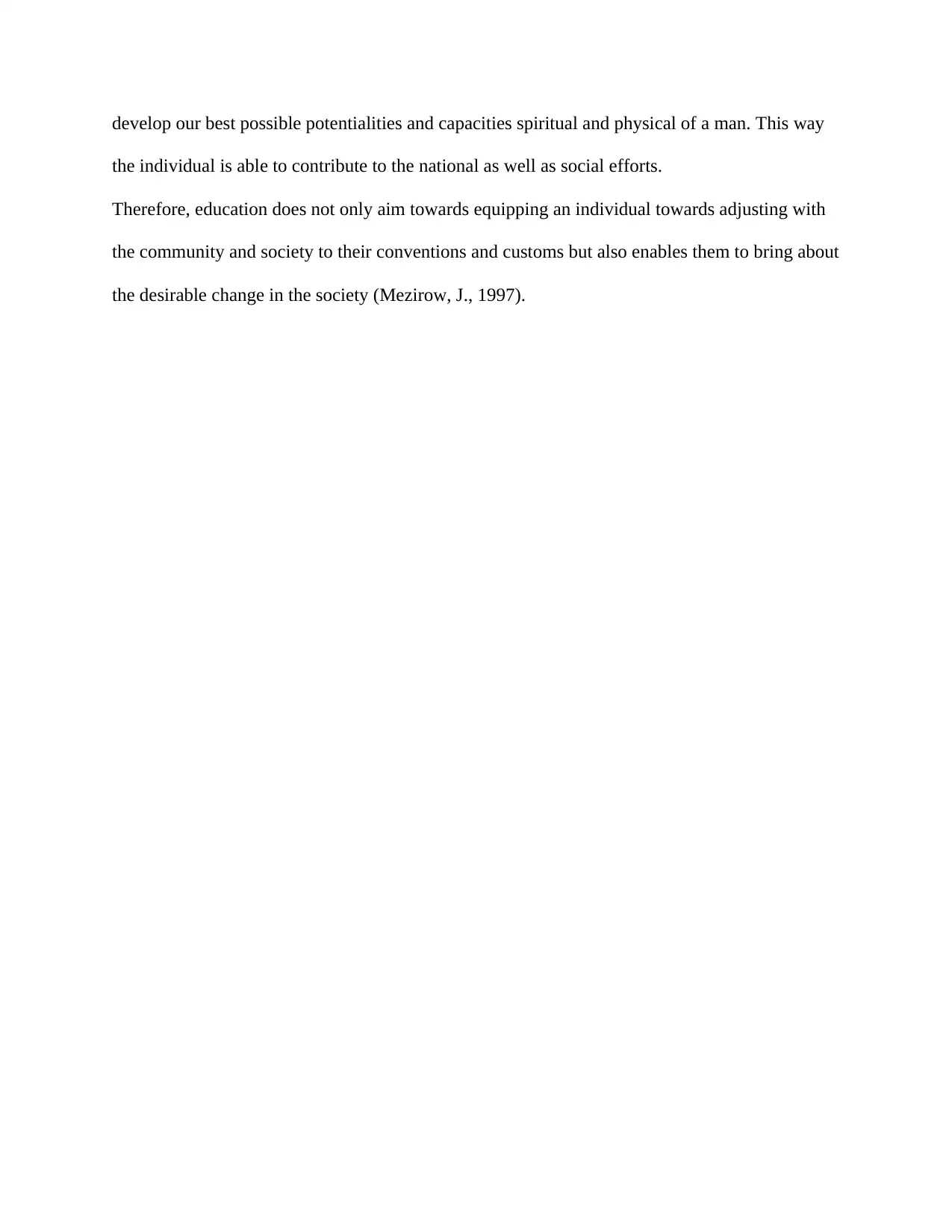
develop our best possible potentialities and capacities spiritual and physical of a man. This way
the individual is able to contribute to the national as well as social efforts.
Therefore, education does not only aim towards equipping an individual towards adjusting with
the community and society to their conventions and customs but also enables them to bring about
the desirable change in the society (Mezirow, J., 1997).
the individual is able to contribute to the national as well as social efforts.
Therefore, education does not only aim towards equipping an individual towards adjusting with
the community and society to their conventions and customs but also enables them to bring about
the desirable change in the society (Mezirow, J., 1997).
⊘ This is a preview!⊘
Do you want full access?
Subscribe today to unlock all pages.

Trusted by 1+ million students worldwide
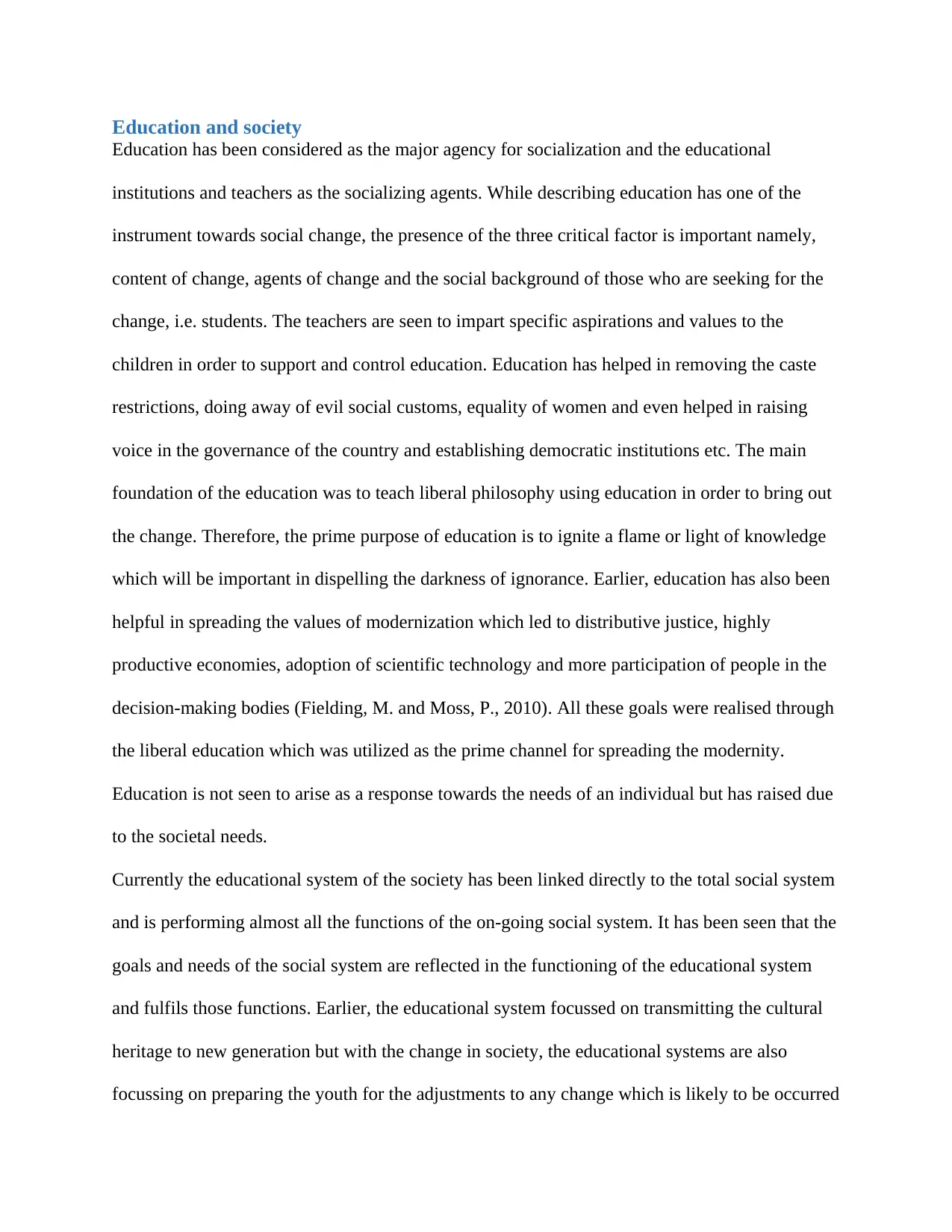
Education and society
Education has been considered as the major agency for socialization and the educational
institutions and teachers as the socializing agents. While describing education has one of the
instrument towards social change, the presence of the three critical factor is important namely,
content of change, agents of change and the social background of those who are seeking for the
change, i.e. students. The teachers are seen to impart specific aspirations and values to the
children in order to support and control education. Education has helped in removing the caste
restrictions, doing away of evil social customs, equality of women and even helped in raising
voice in the governance of the country and establishing democratic institutions etc. The main
foundation of the education was to teach liberal philosophy using education in order to bring out
the change. Therefore, the prime purpose of education is to ignite a flame or light of knowledge
which will be important in dispelling the darkness of ignorance. Earlier, education has also been
helpful in spreading the values of modernization which led to distributive justice, highly
productive economies, adoption of scientific technology and more participation of people in the
decision-making bodies (Fielding, M. and Moss, P., 2010). All these goals were realised through
the liberal education which was utilized as the prime channel for spreading the modernity.
Education is not seen to arise as a response towards the needs of an individual but has raised due
to the societal needs.
Currently the educational system of the society has been linked directly to the total social system
and is performing almost all the functions of the on-going social system. It has been seen that the
goals and needs of the social system are reflected in the functioning of the educational system
and fulfils those functions. Earlier, the educational system focussed on transmitting the cultural
heritage to new generation but with the change in society, the educational systems are also
focussing on preparing the youth for the adjustments to any change which is likely to be occurred
Education has been considered as the major agency for socialization and the educational
institutions and teachers as the socializing agents. While describing education has one of the
instrument towards social change, the presence of the three critical factor is important namely,
content of change, agents of change and the social background of those who are seeking for the
change, i.e. students. The teachers are seen to impart specific aspirations and values to the
children in order to support and control education. Education has helped in removing the caste
restrictions, doing away of evil social customs, equality of women and even helped in raising
voice in the governance of the country and establishing democratic institutions etc. The main
foundation of the education was to teach liberal philosophy using education in order to bring out
the change. Therefore, the prime purpose of education is to ignite a flame or light of knowledge
which will be important in dispelling the darkness of ignorance. Earlier, education has also been
helpful in spreading the values of modernization which led to distributive justice, highly
productive economies, adoption of scientific technology and more participation of people in the
decision-making bodies (Fielding, M. and Moss, P., 2010). All these goals were realised through
the liberal education which was utilized as the prime channel for spreading the modernity.
Education is not seen to arise as a response towards the needs of an individual but has raised due
to the societal needs.
Currently the educational system of the society has been linked directly to the total social system
and is performing almost all the functions of the on-going social system. It has been seen that the
goals and needs of the social system are reflected in the functioning of the educational system
and fulfils those functions. Earlier, the educational system focussed on transmitting the cultural
heritage to new generation but with the change in society, the educational systems are also
focussing on preparing the youth for the adjustments to any change which is likely to be occurred
Paraphrase This Document
Need a fresh take? Get an instant paraphrase of this document with our AI Paraphraser
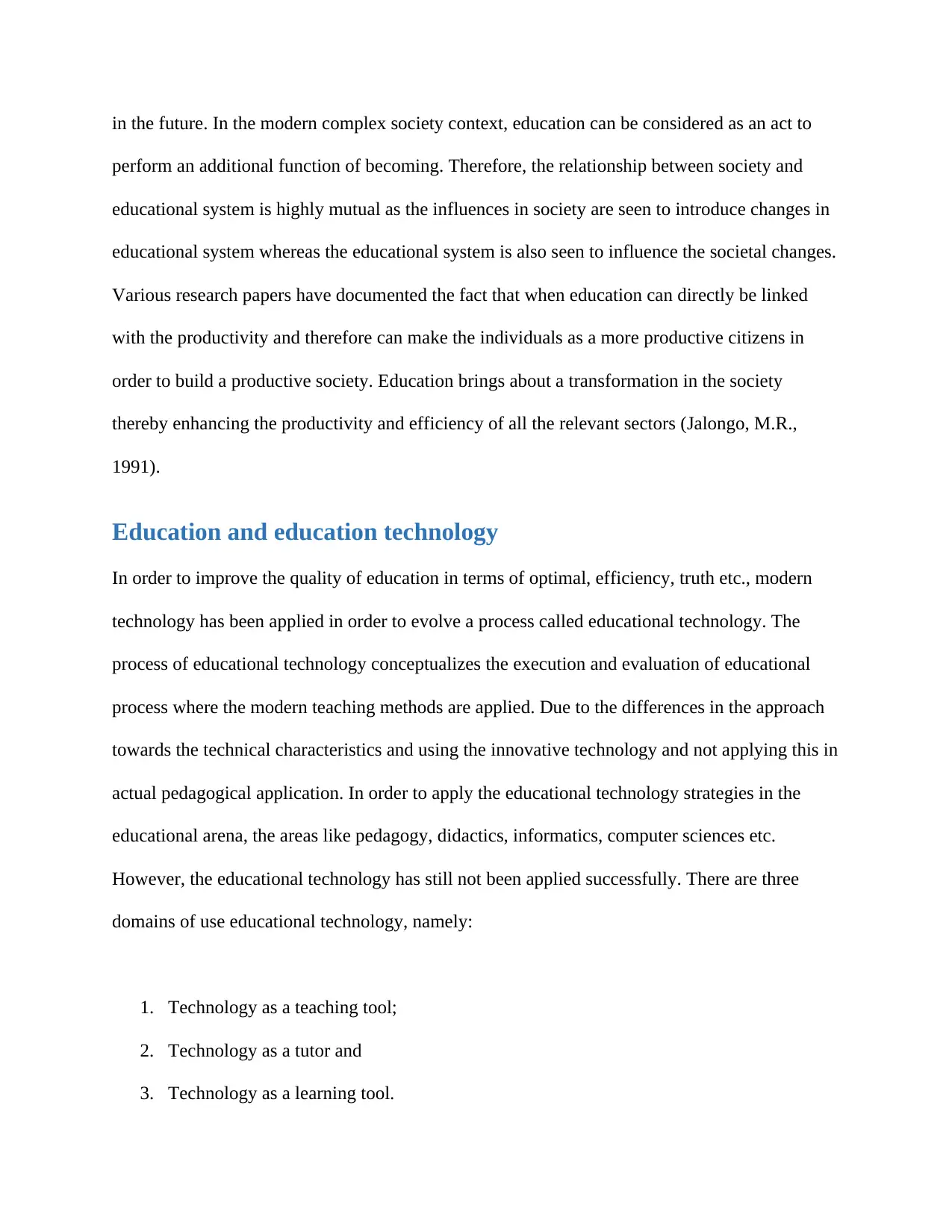
in the future. In the modern complex society context, education can be considered as an act to
perform an additional function of becoming. Therefore, the relationship between society and
educational system is highly mutual as the influences in society are seen to introduce changes in
educational system whereas the educational system is also seen to influence the societal changes.
Various research papers have documented the fact that when education can directly be linked
with the productivity and therefore can make the individuals as a more productive citizens in
order to build a productive society. Education brings about a transformation in the society
thereby enhancing the productivity and efficiency of all the relevant sectors (Jalongo, M.R.,
1991).
Education and education technology
In order to improve the quality of education in terms of optimal, efficiency, truth etc., modern
technology has been applied in order to evolve a process called educational technology. The
process of educational technology conceptualizes the execution and evaluation of educational
process where the modern teaching methods are applied. Due to the differences in the approach
towards the technical characteristics and using the innovative technology and not applying this in
actual pedagogical application. In order to apply the educational technology strategies in the
educational arena, the areas like pedagogy, didactics, informatics, computer sciences etc.
However, the educational technology has still not been applied successfully. There are three
domains of use educational technology, namely:
1. Technology as a teaching tool;
2. Technology as a tutor and
3. Technology as a learning tool.
perform an additional function of becoming. Therefore, the relationship between society and
educational system is highly mutual as the influences in society are seen to introduce changes in
educational system whereas the educational system is also seen to influence the societal changes.
Various research papers have documented the fact that when education can directly be linked
with the productivity and therefore can make the individuals as a more productive citizens in
order to build a productive society. Education brings about a transformation in the society
thereby enhancing the productivity and efficiency of all the relevant sectors (Jalongo, M.R.,
1991).
Education and education technology
In order to improve the quality of education in terms of optimal, efficiency, truth etc., modern
technology has been applied in order to evolve a process called educational technology. The
process of educational technology conceptualizes the execution and evaluation of educational
process where the modern teaching methods are applied. Due to the differences in the approach
towards the technical characteristics and using the innovative technology and not applying this in
actual pedagogical application. In order to apply the educational technology strategies in the
educational arena, the areas like pedagogy, didactics, informatics, computer sciences etc.
However, the educational technology has still not been applied successfully. There are three
domains of use educational technology, namely:
1. Technology as a teaching tool;
2. Technology as a tutor and
3. Technology as a learning tool.
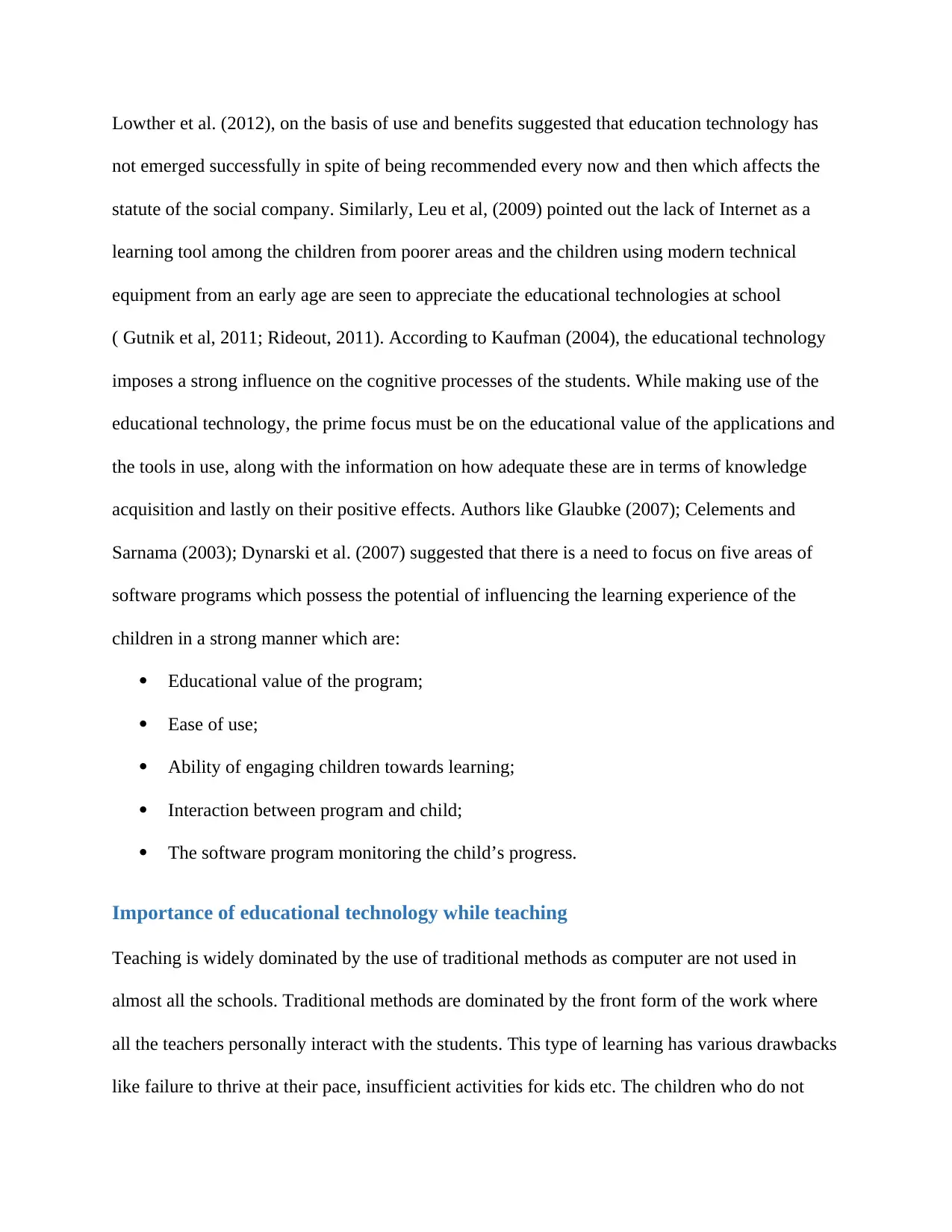
Lowther et al. (2012), on the basis of use and benefits suggested that education technology has
not emerged successfully in spite of being recommended every now and then which affects the
statute of the social company. Similarly, Leu et al, (2009) pointed out the lack of Internet as a
learning tool among the children from poorer areas and the children using modern technical
equipment from an early age are seen to appreciate the educational technologies at school
( Gutnik et al, 2011; Rideout, 2011). According to Kaufman (2004), the educational technology
imposes a strong influence on the cognitive processes of the students. While making use of the
educational technology, the prime focus must be on the educational value of the applications and
the tools in use, along with the information on how adequate these are in terms of knowledge
acquisition and lastly on their positive effects. Authors like Glaubke (2007); Celements and
Sarnama (2003); Dynarski et al. (2007) suggested that there is a need to focus on five areas of
software programs which possess the potential of influencing the learning experience of the
children in a strong manner which are:
Educational value of the program;
Ease of use;
Ability of engaging children towards learning;
Interaction between program and child;
The software program monitoring the child’s progress.
Importance of educational technology while teaching
Teaching is widely dominated by the use of traditional methods as computer are not used in
almost all the schools. Traditional methods are dominated by the front form of the work where
all the teachers personally interact with the students. This type of learning has various drawbacks
like failure to thrive at their pace, insufficient activities for kids etc. The children who do not
not emerged successfully in spite of being recommended every now and then which affects the
statute of the social company. Similarly, Leu et al, (2009) pointed out the lack of Internet as a
learning tool among the children from poorer areas and the children using modern technical
equipment from an early age are seen to appreciate the educational technologies at school
( Gutnik et al, 2011; Rideout, 2011). According to Kaufman (2004), the educational technology
imposes a strong influence on the cognitive processes of the students. While making use of the
educational technology, the prime focus must be on the educational value of the applications and
the tools in use, along with the information on how adequate these are in terms of knowledge
acquisition and lastly on their positive effects. Authors like Glaubke (2007); Celements and
Sarnama (2003); Dynarski et al. (2007) suggested that there is a need to focus on five areas of
software programs which possess the potential of influencing the learning experience of the
children in a strong manner which are:
Educational value of the program;
Ease of use;
Ability of engaging children towards learning;
Interaction between program and child;
The software program monitoring the child’s progress.
Importance of educational technology while teaching
Teaching is widely dominated by the use of traditional methods as computer are not used in
almost all the schools. Traditional methods are dominated by the front form of the work where
all the teachers personally interact with the students. This type of learning has various drawbacks
like failure to thrive at their pace, insufficient activities for kids etc. The children who do not
⊘ This is a preview!⊘
Do you want full access?
Subscribe today to unlock all pages.

Trusted by 1+ million students worldwide
1 out of 24
Related Documents
Your All-in-One AI-Powered Toolkit for Academic Success.
+13062052269
info@desklib.com
Available 24*7 on WhatsApp / Email
![[object Object]](/_next/static/media/star-bottom.7253800d.svg)
Unlock your academic potential
Copyright © 2020–2025 A2Z Services. All Rights Reserved. Developed and managed by ZUCOL.





